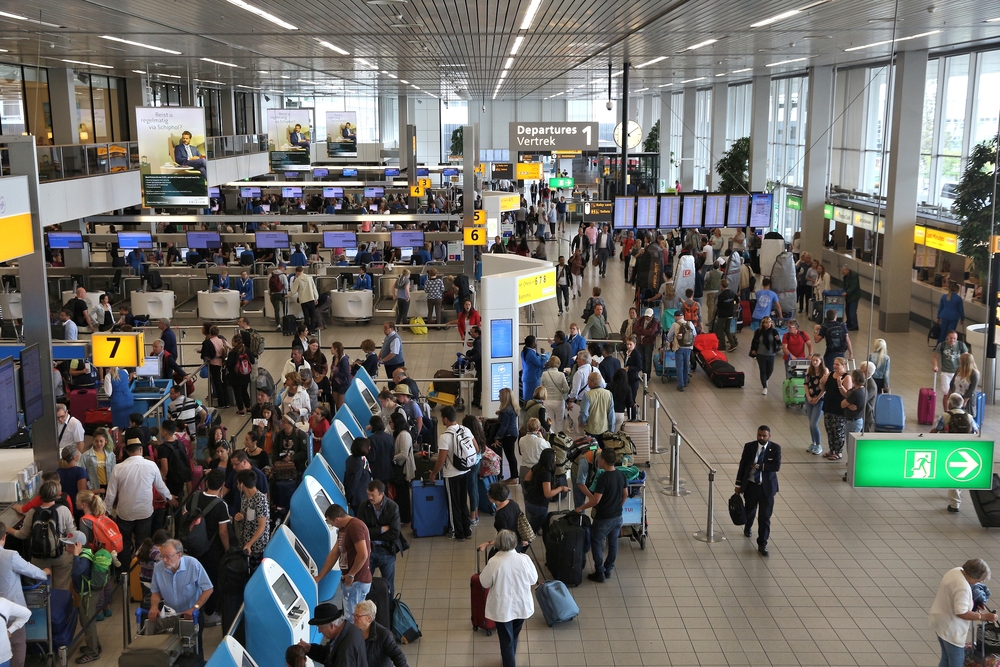EU countries discuss cutting air passengers’ compensation rights
Claudia Delpero
EU countries are discussing changes to air passenger rights that could significantly reduce the chances of receiving compensation for flight cancellations and delays, consumer groups have warned.
Current rules require airlines operating in the EU to compensate passengers for cancellations, delays of more than three hours, and over-bookings. Compensation amounts range from €250 to €600 depending on the flight distance, except in cases of “extraordinary circumstances” beyond the airline’s control, such as bad weather.
Travellers are also entitled to free rebooking to reach their destination or a refund if they cancel their trip because of the disruption.
According to data from compensation firm Skycop.com, which helps travellers claim money for flight problems, nearly 218,000 flights departing from the EU, EEA and Britain were delayed by more than three hours or cancelled in 2024 — 1.5% of the total. The Netherlands was the second-worst performing country after Luxembourg, at 2.7%.
The current rules on compensation have been in place since 2005. In 2013, the European Commission proposed clarifying several elements, including the definition of “extraordinary circumstances”. However, EU member states, which must agree the final text with the European parliament, failed to reach a common position. As a result, the proposal remained on hold for more than 10 years.
In early 2025, Poland, which currently holds the rotating presidency of the EU Council, put the issue back on the agenda. EU ambassadors will discuss the revised proposal on Wednesday, and ministers could sign off on the agreement in June.
Steven Berger, head of consumer rights at European organisation BEUC, told Dutch News: “There are more than 200 cases at the EU Court of Justice related to the implementation of this regulation, so it would be positive to make the text clearer and reinforce the possibility for consumers to exercise their rights.”
What EU countries are currently discussing, however, “means going back on a lot of current rights”, he said.
[banner1]
One of the most controversial proposals is to raise the threshold for compensation to five or nine hours of delay, depending on the flight distance.
Airlines for Europe (A4E), the Brussels-based industry body representing airlines including Air France-KLM, Lufthansa, EasyJet and Ryanair, has long pushed for such an extension.
“When things go wrong, it takes time to find a replacement plane or crew. By extending the thresholds, airlines will have a fighting chance of finding a solution that could recover the flight schedule and get passengers to their destination,” the organisation said in a statement.
But BEUC, which includes Dutch group Consumentenbond, argues that 85% of passengers would lose their right to compensation under the new thresholds.
Sources told Dutch News that the Dutch government supports the five-hour threshold, although it is still finalising its position.
Extraordinary circumstances
Another issue is the proposed list of “extraordinary circumstances” that would exempt airlines from paying compensation. BEUC says this should reflect the established rulings of the EU Court of Justice, but “the current proposal discussed in the Council largely departs from that jurisprudence”, the group warned in a letter.
For example, the court has ruled that airline staff strikes are not extraordinary if they are linked to internal company issues. Yet under the new rules, such strikes would be exempt.
The proposal would also remove compensation rights for people who decide to cancel their trip — for instance, because they have missed an important meeting — and who opt for a refund rather than being rerouted to their destination.
Compensation cap
Another point of contention is the possible introduction of a cap on reimbursement for passengers who make their own travel arrangements if the airline fails to reroute them after a three-hour delay, Berger said.
“No-show” clauses, which cancel the return journey if a passenger misses the outbound leg, are also set to remain. These clauses have already been ruled unfair by supreme courts in Germany, Austria and Spain.
BEUC, the European Passenger Federation (EPF), and other organisations have written to EU ambassadors urging them to ensure that any reform “strengthens passenger rights and their enforcement, and does not diminish them”.
A4E, however, says the focus should be to “return towards reducing the impact of disruption and facilitating the recovery of flight schedules to benefit passengers directly”.
Hand luggage
The European parliament is also weighing a separate proposal to amend rules on hand luggage fees. The EU Court of Justice has ruled that hand luggage is a “necessary aspect” of the journey and should not incur extra charges, but many airlines continue to levy fees.
According to a survey by Consumentenbond, 78% of people in the Netherlands want clearer rules, while 86% said a small suitcase should be “the bare minimum” included in any airline ticket.
Thank you for donating to DutchNews.nl.
We could not provide the Dutch News service, and keep it free of charge, without the generous support of our readers. Your donations allow us to report on issues you tell us matter, and provide you with a summary of the most important Dutch news each day.
Make a donation